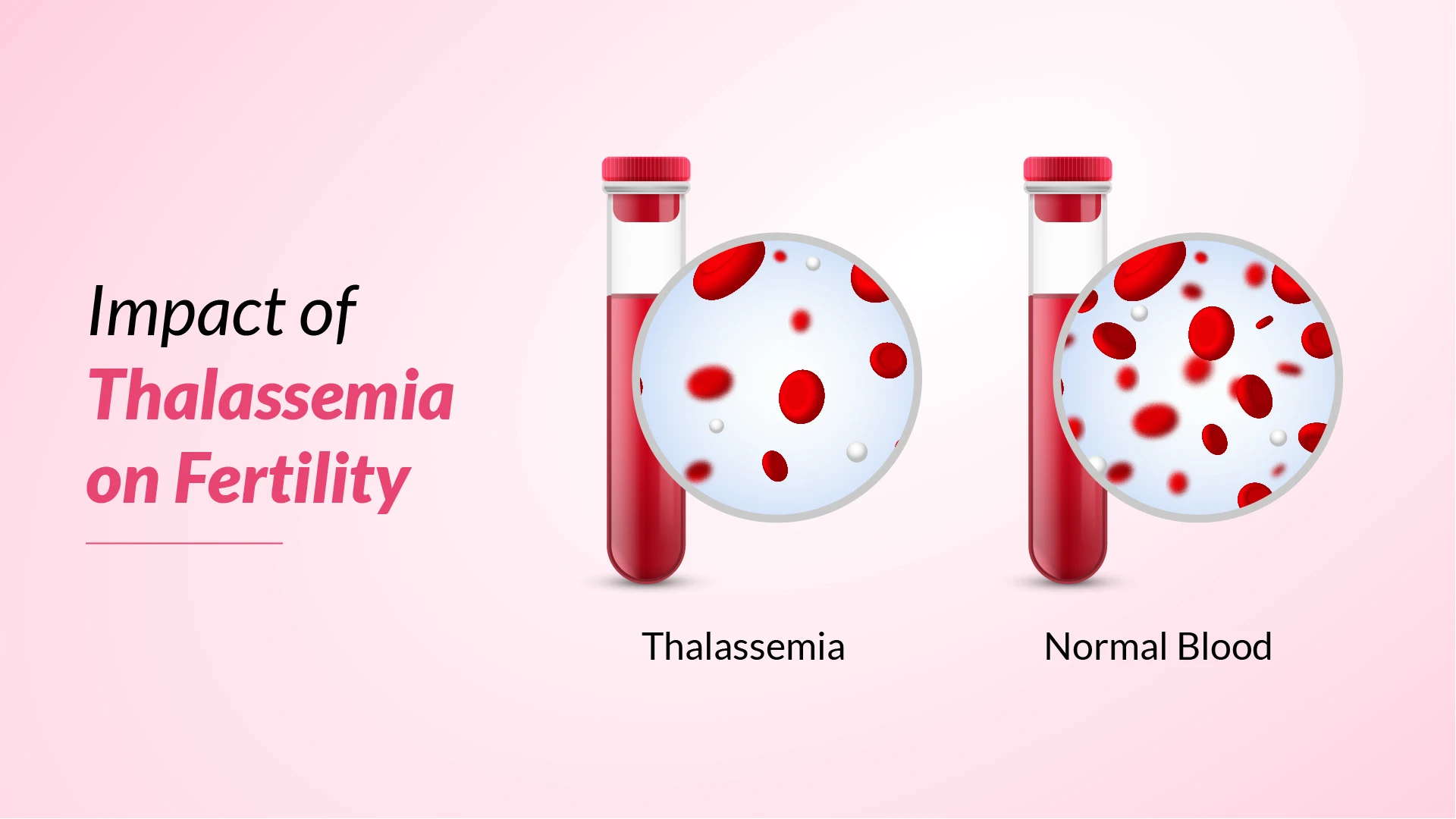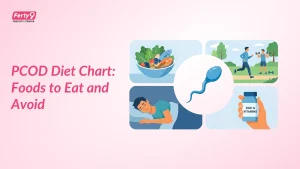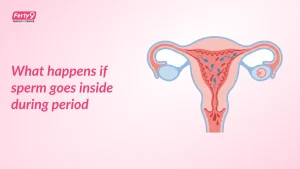A wide range of blood disorders known as thalassemia affects the hemoglobin genes, leading to inefficient erythropoiesis (red blood cell production). Thalassemia disease has a major effect on fertility since it can impair family planning and reproductive health by creating hormonal imbalances and difficulties in both men and women. Comprehending the complex correlation between thalassemia and fertility is essential for creating focused treatments and assistance for individuals impacted.
Also read: How Iron Deficiency Impacts Fertility
What is Thalassemia Disease?
Thalassemia disease is a hereditary blood condition that impacts hemoglobin synthesis, resulting in anemia and other health issues. In such cases, regular blood transfusions are necessary to maintain hemoglobin levels. Red blood cells, or RBCs, contain a protein called hemoglobin, which is in charge of transporting and delivering oxygen to various bodily areas. Alpha and Beta are two identical protein chains that make up the hemoglobin found in red blood cells. The two types of thalassemia, namely Alpha Thalassemia and Beta Thalassemia, are classified based on the defective protein chain.
Thalassemia disease can expose a patient to a number of health problems since it results in a deficiency of hemoglobin and red blood cells. The thalassemia symptoms can vary from mild to severe, depending on the type of thalassemia. It is a health condition that is inherited rather than acquired in both adults and children.
Challenges Faced by Individuals with Thalassemia
Persistent anemia, physical difficulties from iron overload, and reproductive problems that make family planning more difficult are among the chronic health issues that people with thalassemia experience. Anxiety and social isolation can result from the emotional strain of managing a chronic illness. To improve the quality of life for individuals impacted, prompt thalassemia diagnosis and access to specialist treatment and medical assistance are essential.
Reduced Fertility Potential
Male and female fertility can be greatly impacted by thalassemia, a hereditary blood condition marked by decreased hemoglobin synthesis. Menstrual abnormalities, hormonal imbalances, and pregnancy issues, including preterm labor and gestational diabetes, can result from thalassemia syndrome in females. Thalassemia syndrome in males includes low testosterone levels and poor sperm production. Reproductive decisions and results may also be impacted by the mental and physical strains of treating thalassemia.
Increased Risk of Complications During Pregnancy
Pregnant individuals face increased risk of various complications that impact both mother and fetus, and such risks include:
- Diabetes
- Gestational hypertension
- Gallbladder or kidney stones
- Placental abruption.
- UTI (Urinary tract infection)
Although uncommon, cardiac issues during pregnancy can occur and pose a serious risk to life. Consult your healthcare practitioner about ways to support your heart both during and after pregnancy. To reduce these risks and ensure a favorable pregnancy result for people with thalassemia, comprehensive prenatal care and a multidisciplinary approach are crucial.
Also read: Guide to Pregnancy Complications
How Thalassemia Can Affect Fertility?
Patients suffering from thalassemia and infertility may face additional challenges. Thalassemia might affect your chances of conception. Thalassemia may negatively impact fertility by altering hormonal balance.
Anemia
Anemia can have a detrimental influence on fertility because it causes hormonal imbalances that interrupt women’s menstrual cycles, potentially leading to irregular ovulation and problems conceiving. In males, anemia can lower testosterone levels, impacting libido and sperm production. Furthermore, the exhaustion and weakness caused by anemia may reduce general health and motivation.
Premature Ovarian Aging
For people with thalassemia, premature ovarian aging is a serious concern. This condition is frequently brought on by hormonal imbalances and long-term health issues linked to the condition. The reproductive potential of women with thalassemia may be impacted by decreased ovarian reserve and an earlier menopausal onset. Reduced fertility and unpredictable menstrual periods may result from this rapid aging of the ovaries.
Pregnancy Complications
Despite the fact that women with the thalassemia trait are typically asymptomatic prior to pregnancy, anemia may develop during pregnancy due to physiological changes that worsen during pregnancy (30% increase in red blood cell volume and 40% increase in total blood volume). Although alpha thalassemia minor usually results in moderate anemia that may not have a major impact on pregnancy outcomes, it has to be closely monitored in order to handle any possible issues. There are serious dangers associated with beta-thalassemia and pregnancy, particularly if the illness is more severe. These concerns include anemia, a greater need for blood transfusions, and an increased chance of premature delivery. To properly control these risks and guarantee the health of the mother and the unborn child, close observation and specialist prenatal care are necessary. You or your spouse must get a prenatal medical evaluation if you have thalassemia. Generally, a couple may be unaware that they have thalassemia and pass it on to their offspring.
Probability of Thalassemia in Children
A World Health Organization (WHO) study claims that this illness affects Indian children from birth. Defective genes that impact hemoglobin synthesis are the cause of thalassemia. Parents of a child with thalassemia often only carry one of the defective genes, making them carriers.
The severe type of condition known as thalassemia major is characterized by substantial decreases in hemoglobin synthesis, which results in severe anemia and requires frequent blood transfusions for treatment. On the other hand, those with thalassemia minor, a lesser variant, may have no symptoms or just moderate anemia, which frequently makes the illness easier to manage without the need for ongoing care.
Fertility Treatment Options for People with Thalassemia
In vitro fertilization (IVF)
In individuals with thalassemia, IVF has increased the likelihood of delivering a healthy child with the emergence of sophisticated assisted reproductive techniques. In IVF, the male and female gametes are fertilized to create an embryo, which is then cultivated to the blastocyst stage. The culture’s cells are sent for genetic analysis when a biopsy is performed once it has developed into a blastocyst (day 5 of development). This makes it easier to distinguish between healthy and diseased embryos. An embryo transfer will subsequently be performed on the high-quality embryo that exhibits no symptoms of thalassemia. Couples with thalassemia minor and iron deficiency may also have a chance of having a healthy child if the implantation procedure is successful. IVF treatments work better for those who have damage in their fallopian tubes or endometrium.
Intracytoplasmic Sperm Injection (ICSI)
For people with thalassemia, intracytoplasmic sperm injection (ICSI) is a reproductive therapy option, especially when male infertility is a problem because of reduced sperm production. For people with thalassemia who are having trouble conceiving, ICSI is frequently used in conjunction with in vitro fertilization (IVF) to boost the likelihood of a successful pregnancy.
PGT-M
One of the most important reproductive options for people with thalassemia who want to avoid passing the disorder on to their children is preimplantation genetic testing for monogenic disorders (PGT-M). By checking embryos for the thalassemia gene mutation prior to implantation, PGT-M ensures that only unaffected embryos are chosen for transfer. For couples where either or both of them are carriers of the condition, this method provides a safe reproductive option by lowering the chance of conceiving a kid with thalassemia.
Ferty9 IVF: Your Partner in Overcoming Thalassemia-Related Fertility Challenges
Ferty9 IVF is committed to using cutting-edge reproductive technologies to assist individuals and couples in overcoming thalassemia-related infertility issues. Ferty9 provides customized solutions to stop genetic transmission and improve reproductive results through specialist services like ICSI and PGT-M. Despite thalassemia, you can come to Ferty9 IVF to help you have a healthy family.
Conclusion
Due to hormonal abnormalities, decreased reproductive function, and an increased risk of pregnancy problems, thalassemia can have a substantial impact on fertility. Early diagnosis, specialist reproductive treatments, and all-encompassing medical care are necessary to address these issues. People with thalassemia can increase their chances of having a successful family planning experience with the correct assistance and measures.





























